Dr. Adrienne Starks: Accomplished Scientist Paves The Way for Students in Alabama
By Chianti C. Cleggett For The Birmingham Times More than a mentor, more than a nonprofit leader, and more than an accomplished scientist, Adrienne Starks, Ph.D., remains a proud product of Fairfield, Alabama, someone who is eager to create opportunities for “undervalued and underserved” youth around Alabama and beyond. With all of her honors—including being […]

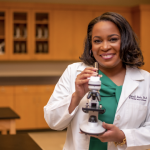
By Chianti C. Cleggett
For The Birmingham Times
More than a mentor, more than a nonprofit leader, and more than an accomplished scientist, Adrienne Starks, Ph.D., remains a proud product of Fairfield, Alabama, someone who is eager to create opportunities for “undervalued and underserved” youth around Alabama and beyond.
With all of her honors—including being a National Science Ambassador who has had her own life-size 3D statue on display at the Smithsonian Institution in Washington, D.C.—and as the founder and CEO of the nonprofit STREAM Innovations, Starks never forgets the role her hometown has played in her success: her family has been in the city for three generations and she was educated in Fairfield City Schools, even attending the same elementary school her grandfather did.
“It has been an amazing opportunity to pursue a passion in science that I have had since I was a kid and very humbling to represent my home state of Alabama, she said. “I count it as an honor to be recognized among other scientists that have worked to make our world better.”
Those scientists, Starks included, serve as American Association for the Advancement of Science (AAAS) IF/THEN ambassadors. Dr. Starks was one 124 women featured in #IfThenSheCan, an exhibit of 120 3D printed statues that celebrate contemporary women leaders and innovators in a variety of fields in science, technology, engineering, and math (STEM) designed as part of an effort to inspire girls and women.
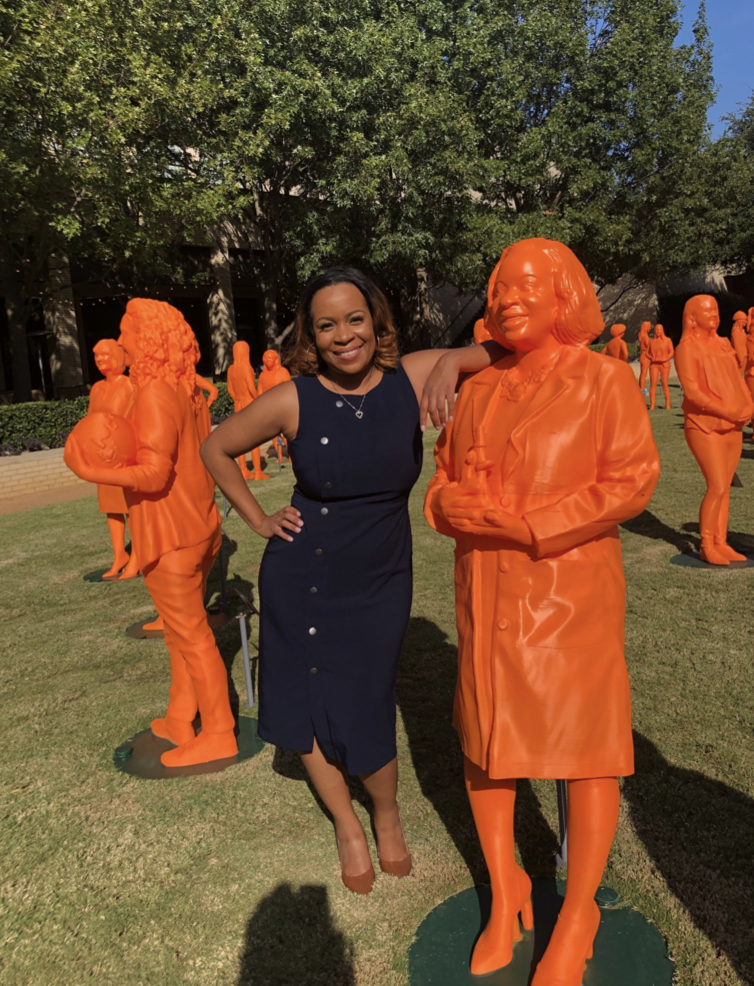
“I am still in awe about having a statue,” she said. “It is still very surreal after two years. I am a fan girl of the other 123 women with whom I share the honor of being an AAAS IF/THEN Ambassador.”
Discovering a Passion
How did Starks fall in love with science?
At the end of her freshman year in high school, she participated in a science program called BioTeach at the University of Alabama at Birmingham (UAB): “I was the only person from Fairfield. There were students from [The Altamont School], Indian Springs [School], A. H. Parker High School, and Woodlawn High School. We did experiments, and I was hooked.”
The students were paid to attend, but Starks would have done it for free because it spoke to her desire to experiment and discover. She participated for two years and wanted to return during her junior year, but she learned that the program had ended due to a lack of grants. By then, science was her passion.
As a child, Sparks asked for a microscope and loved using it to examine leaves, bugs, and other outdoor things.
“It helped that I had a cousin, who was about 10 years older than me, who was very interested in science,” she recalled.
Whenever that cousin, Kenneth Starks, who is now a teacher in Georgia, visited from Atlanta, they explored science together, and he would often send her biochemistry books. All of those experiences became the foundation for STREAM—Science, Technology, Reading, Engineering, Arts, and Mathematics—Innovations, which Starks founded in 2015.
In 2017, STREAM launched with three programs in Birmingham’s Inglenook community. Starks partnered with the leaders and students of the Inglenook K-8 School, Inglenook Library, and Inglenook Recreation Center to build her dream organization. “My partners there were champions for what I was doing,” she recalled.
Again, Starks’ upbringing plays a role in her organization.
First, STREAM Innovations provides leaders and mentors who care: “Everyone can identify the teachers that made an impact in their life,” she said.
And, second, the organization introduces students to the possibilities in their imaginations. Recalling her time as a young student, Starks said, “My imagination took me farther than what sometimes the classroom would allow us to do, … farther than what was potentially available to me in Fairfield, in Birmingham, in Alabama.”
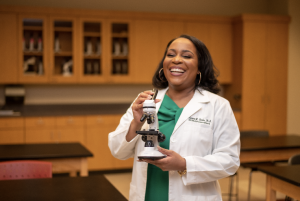
Journey Into Science
Though there was never a discussion about her entire family being involved in the STEM field, it certainly seems to have been part of a divine order.
Starks earned a Bachelor of Science degree in biology from Alabama Agricultural and Mechanical University (AAMU) and followed it with a doctorate in biological sciences from the University of Maryland Baltimore County (UMBC). Her younger sister is a nurse, her younger brother is an engineer, her mom is a retired registered nurse, and her father was in financial services.
“It wasn’t something that was planned. It was just how things kind of fell into place,” Starks said. “It was natural. It was our parents supporting some of the passions we had and giving us the opportunity to continue to pursue those things.”
Starks, herself, was discovering how her passions were guiding her future career. “Scientists are trained to ask questions because we are interested in understanding why or how something works,” she said.
Furthermore, it was becoming clearer to her that she, as a Black woman, could truly have a place in science. Starks cites Dr. Mae Jemison—an engineer, physician, and former NASA astronaut—as the first Black woman she’d seen connecting science with discovery.
“Scientists don’t have to look like [renowned physicist] Albert Einstein,” Starks said. “I have met scientists of different genders, cultural backgrounds, and abilities that are rock stars in their fields.”
HBCU Alum
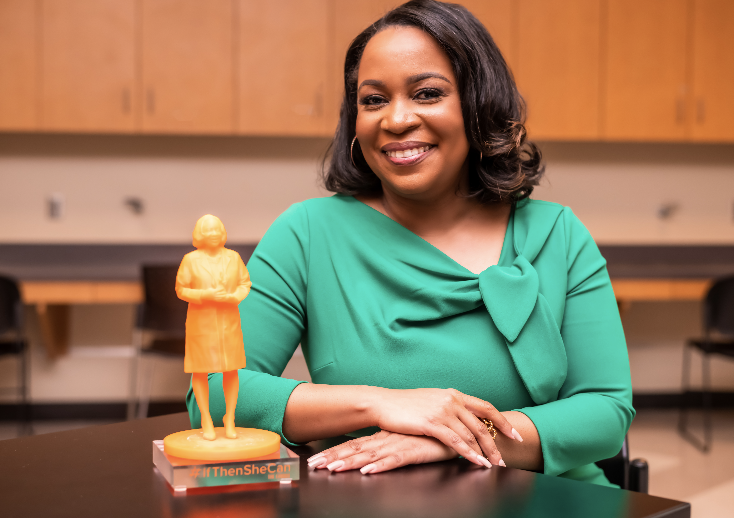
Starks received a full academic scholarship to attend AAMU, a historically Black college and university (HBCU) in Huntsville, Alabama.
“I attended [AAMU] because I had friends that were going. We were already in honors classes together, so I knew this was a group of students that would continue to push me. Our expectation was to leave with degrees and go on to do other things. While attending, it turned into much more than that,” she said.
“Many students [from my time there] are either on reality shows, commentating on the news, looking for cures for cancer, or in high-ranking positions with federal agencies across the country,” Starks added. “It’s definitely the [personification of the AAMU] motto: ‘Start here, go anywhere.’”
As a student at AAMU, Starks’ plan was to attend medical school. During her sophomore year, she participated in a medical minorities enrichment program at UAB, where she shadowed a Black woman physician in radiation oncology, which involves aspects of research related to the treatment of cancer using radiation. The doctor shared the hard truths of being a physician with Starks while they completed rounds together. The takeaway for Starks: radiation oncology is not glamorous.
“It did show me that being a physician is not just about helping people. Being a physician is also carrying that burden of whether you have the ability, expertise, or technology to help individual cases,” Starks said. “There was a young woman in her 20s that had cancer, and [the doctor] had to tell this young woman that there were no other treatments she could do and that surely within a certain period of time she would probably die. [Shadowing that doctor] showed me that this never gets easier. It is always hard.”
The reality check made Starks question her future path to medical school.
“After that day, I was like, ‘I don’t know if I want to do this.’ I didn’t know if I wanted to compartmentalize my emotions and my attachment to patients to be the best physician that I could be,” Starks said.
Health Inequities
Eventually, Starks chose to pursue a doctorate in biological sciences at the UMBC, where she met the now-retired UMBC President Freeman Hrabowski III, Ph.D., who became her mentor.
“He believes not just in the importance of education but what you can do with an education,” Starks said. “Dr. Hrabowski is an African American man. He’s also from Birmingham. He was part of the Children’s Crusade, [when 5,000 students marched for Civil Rights in Birmingham in May 1963]. For a semester or two, he was at [AAMU] a dean for the school of math, but I had never met him, had never heard of him before.”
Around the time Starks graduated from UMBC, she met with Hrabowski at his request, and he inquired about her next move. After she told him she was uncertain, he suggested that she consider a career in health disparities.
Starks recalled, “He said, ‘Our community needs someone who understands the genetic aspects of why you see health differences and poor health outcomes.’ I didn’t know what health disparities were at the time, but I wasn’t going to ask him. So, I said, ‘Alright, sure.’”
When Starks researched the subject, she was surprised that it touched on everything she wanted to do in her career.
“I was able to connect my doctoral work in quantitative genetics with understanding why African Americans have poorer health outcomes with chronic disease. I was able to study how stress, discrimination, social determinants of health, and legislative policies reinforce health inequities across the country,” she said.
Starks eventually landed a postdoctoral research position at the National Cancer Institute, where she did research on breast and prostate cancer disparities. She found her work intriguing—yet, more and more, the scenes from Fairfield that she saw via social media began slowly calling her to return home.
“My hometown was not reflecting what I grew up experiencing. I didn’t know very high crime. I didn’t know what it looked like when you didn’t have leadership that was innovative,” she said. “I grew up in the day and age when [the late] Larry Langford was my mayor. Our mayor came to our school on a regular basis to encourage and support us. … The idea that students were not excelling and that all of the negative things were being perpetuated at higher rates, that just didn’t feel like the place that I called home.”
 Back Home
Back Home
Starks decided that once she completed her first postdoctoral work, she would apply for a second postdoctoral position, return to Fairfield for the in-between time, and start a nonprofit to help young people in her hometown.
Back in Fairfield in 2014, Starks decided to pivot from going back into the lab to “see what this nonprofit thing was going to be,” she said.
The longer she stayed away from research, though, the smaller her chances of returning: “If you’re three years out, it’s very difficult for someone to take a risk on you getting back into that groove again,” said Starks.
In 2015, she founded STREAM Innovations.
In her spare time, Starks, who is single and does not have children, enjoys painting and relaxing at the beach. She is a member of the Tri-County Chapter of The Links, Incorporated. She serves on the McWane Science Center board of trustees, the Arts Collaborative of Greater Birmingham board of directors, and as a council member for the Alabama STEM Council. This year, she would like to take up gardening and catch some of the concerts and shows coming to Birmingham.
The scientist plans to continue championing the importance of girls in STEM, and her long-term goals include becoming an international company that supports students on the continent of Africa, across the African diaspora, and on the Caribbean Islands. Closer to home, she hopes to use her programs to affect policy in Alabama.
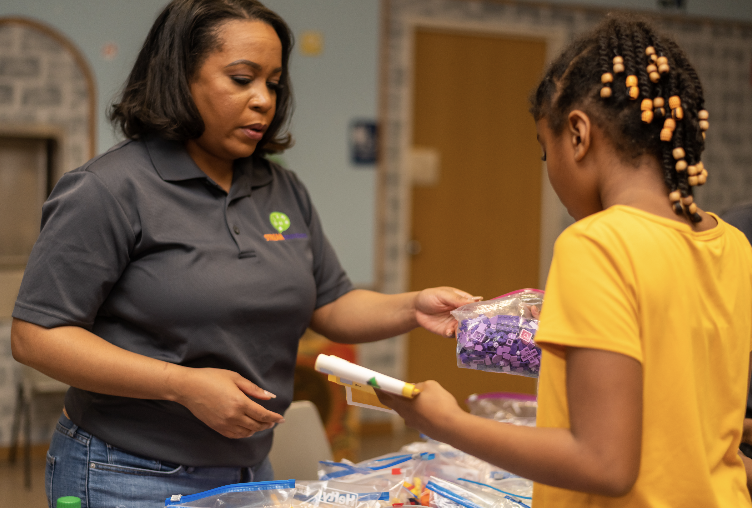 “I have learned a lot from our students. We call them innovators,” Starks said. “I have learned the importance of leadership, having mentors, and having champions … not just to coach you, not just to provide critiques, but also to help you find your own stride.”
“I have learned a lot from our students. We call them innovators,” Starks said. “I have learned the importance of leadership, having mentors, and having champions … not just to coach you, not just to provide critiques, but also to help you find your own stride.”
To learn more about STREAM Innovations, visit www.streaminnovations.org.







